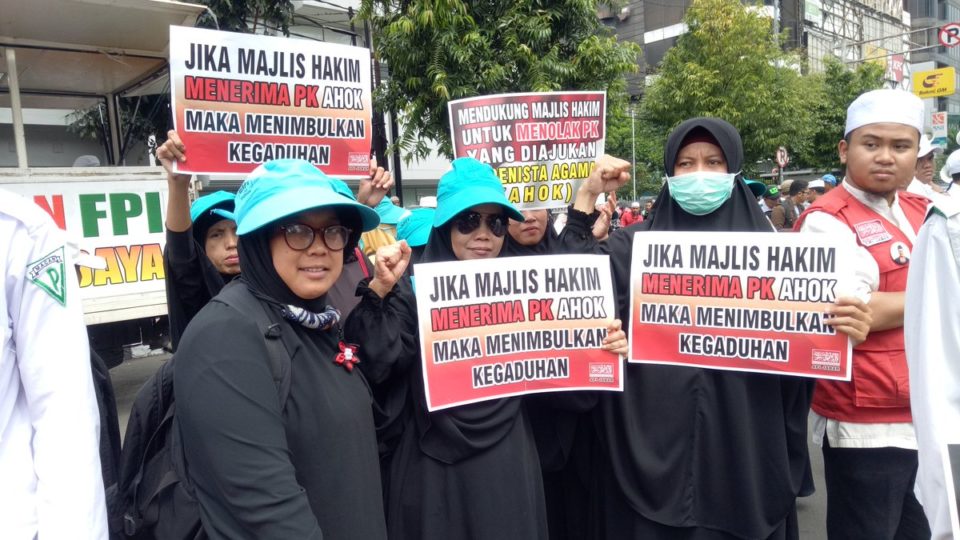Today was the first courtroom hearing in former Jakarta Governor Basuki Tjahaja Purnama’s judicial review (PK) of the guilty verdict in his controversial blasphemy trial. Although the court session only lasted ten minutes, it brought out several dozens of protesters both for and against the former governor.
Many of the protesters came from a group called the Islamic Movement Alliance (API). Some held banners saying “Reject Ahok’s PK. Enforce justice. Ahok must be punished.”
Pro-Ahok demonstrators answered back with chants of “Free Ahok!” and “Ahok is innocent!” Some yelled “Arrest Rizieq!” referring to Rizieq Shihab, the fugitive founder of the Islamic Defenders Front (FPI) and the figurehead of the anti-Ahok movement.
Around 2,000 police were assigned to safeguard the court session, which took place at the North Jakarta Courthouse on Jalan Gajah Mada this morning.
The brief hearing, which Ahok did not attend, was primarily a procedural affair, with Ahok’s legal team simply submitting the new evidence used to file the PK. The judge will announce whether the new evidence forms a valid basis for the PK next week.
“Hopefully next Monday I can give my opinion whether to send this to the Supreme Court,” said head judge Mulyadi as quoted by Detik.
Once the session was finished, the protesters peacefully dispersed soon after without incident.
Many were shocked last week to learn about Ahok and his legal team’s decision to file a PK, considering that he is already nearly one year into his 2-year sentence and he had previous decided against filing an appeal against the verdict.
However, a PK is legally distinct from an appeal and carries fewer risks (such as the possibility of having one’s prison sentence increased if they lose their appeal). A PK can be filed on the basis of new evidence or circumstances in a case.
For Ahok’s PK, the major new piece of evidence is the guilty verdict in the case of Buni Yani, the man who uploaded a short clip of a speech Ahok gave in the Thousand Islands that contained the alleged blasphemy against Islam. Buni Yani was sentenced in November for spreading hate speech by sharing just a 30-second clip of the nearly 2-hour long speech (along with an inaccurate transcript). The incendiary clip was the primary incitement for the anti-Ahok protests that eventually led to the former governor’s election loss and imprisonment.
As we understand the argument from Ahok’s side, the verdict in his case and Buni Yani’s case are based on directly contradictory legal opinions. Buni Yani was convicted largely because the judges said that his editing of the clip had been meant to incite hatred, and yet in Ahok’s case the judge determined that the clip being edited had not affected the blasphemous nature of what Ahok had said about a verse from the Koran.
The next session for Ahok’s PK will take place next Monday.




